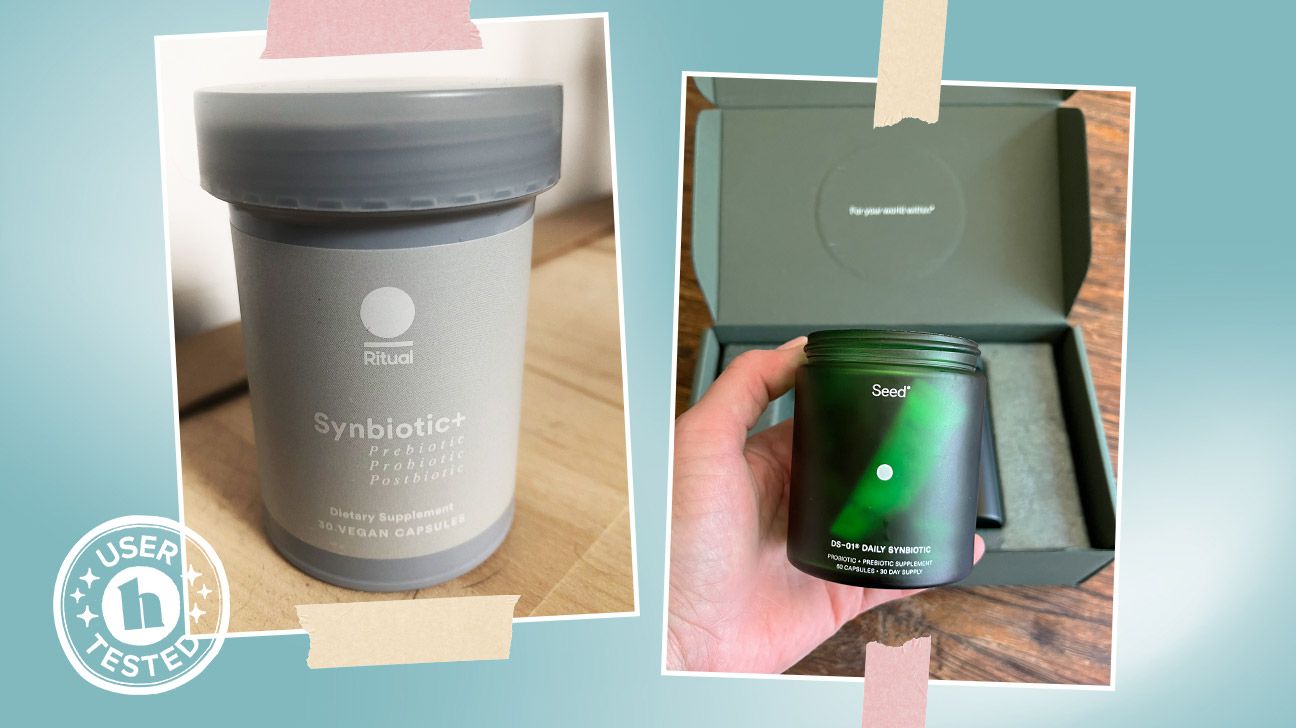Key takeaways
- Probiotics may help with digestion, immune health, vaginal health, symptoms of anxiety and depression, fatigue, or chronic conditions that affect the gut.
- Some people supplement with capsule, powder, or beverage forms of probiotics. But you don’t need to take supplemental probiotics if you eat a balanced diet that includes natural probiotics and have generally good health.
- Probiotics can either be shelf-stable for travel or require refrigeration, like mindbodygreen Advanced Probiotic+. We’ve tested several options at different price points to help you decide.
You may take probiotics to help reduce symptoms of certain medical conditions, bolster your immune health, or promote weight management or mental wellness.
Not everyone needs to take a probiotic supplement, but if you and your healthcare team decide that you may benefit from one, there are many excellent products out there.
This article features our picks of the 11 best probiotic supplements on the market. It also explains what probiotic supplements are, who may benefit from taking one, and how to choose the right product for your needs.
Pricing guide
- $ = under $0.50 per serving
- $$ = $0.50 to $1 per serving
- $$$ = over $1 per serving
Disclaimer: Some of the probiotics tested below were provided for free by supplement manufacturers. Our opinions are ours alone and have not been reviewed, approved, or otherwise endorsed by the brands.
• IBS symptoms
• diarrhea
• IBS symptoms
• subscription
• Bifidobacterium animalis ssp. lactis BB-12
• digestive health
• Bifidobacterium lactis Bi-07
• Bifidobacterium lactis HN019
• eco-friendly subscription
• Lacticaseibacillus casei
• Bifidobacterium breve and more
• general digestive health
• Lactobacillus rhamnosus
• Lactobacillus plantarum
• Bifidobacterium lactis
• Lactobacillus plantarum 6595
• Lactobacillus acidophilus
• Bifidobacterium longum
• Lactobacillus casei
• Lactobacillus reuteri
• Lactobacillus rhamnosus
• Lactobacillus gasseri
• Lactobacillus acidophilus La-14
• Lactobacillus acidophillus NCFM
• vitamin blend
We selected the best probiotics using the following criteria. Read more about our methodology for vetting dietary supplements.
- Vetting: All the products have been vetted to ensure that they meet Healthline’s medical and business standards, adhere to Food and Drug Administration (FDA) regulations on allowable health claims and labeling requirements, and are manufactured in facilities that adhere to current good manufacturing practices (CGMPs) established by the FDA.
- Credibility: The products we chose are made by medically credible companies that follow ethical, legal, and industry best standards and that provide objective measures of trust, including having supplements thoroughly tested for purity and potency, ideally by third-party organizations.
- Effective dose: Except one product (which doesn’t use CFUs), all the supplements above contain at least 106 (1 million) CFUs per gram.
- Ingredients: We looked for products that are made from high quality ingredients and free of artificial additives and fillers.
- Personal needs: We included options to suit various needs and preferences, whether you need a specific probiotic strain or follow a gluten-free diet.
- Reviews: We included options that were either tested and recommended by Healthline editors or that have overall positive reviews online.
What are CFUs?
Probiotics are generally measured in colony-forming units (CFUs). These units represent the number of viable bacteria per dose.
Products labeled “1 x 109 CFU” contain 1 billion viable or live bacteria per dose. Most supplements contain
For beneficial effects, probiotics must be taken in quite large doses. Researchers suggest that probiotics must contain at least 106 (1 million) viable CFUs per gram to be able to survive digestion and exert positive effects in the body.
Probiotic supplements have been linked to some health benefits. While research on probiotics has increased significantly over the past 20 years, researchers are still learning about them and their health effects.
Probiotics may:
- Improve symptoms of IBS:
ResearchTrusted Source suggests that probiotics, especially multi-strain products containing Lactobacillus acidophilus, may help improve symptoms of irritable bowel syndrome (IBS), such as bloating and abdominal pain. - Help with diarrhea: Studies indicate that probiotics may help improve multiple types of diarrhea, including
infectiousTrusted Source diarrhea,antibiotic-associatedTrusted Source diarrhea, andtraveler’sTrusted Source diarrhea. Certain strains, includingLactobacillus rhamnosus GGTrusted Source andSaccharomyces boulardiiTrusted Source , seem to be particularly effective for treating diarrhea in children and adults. - Help with constipation: Some probiotics, such as Bifidobacterium lactis, may help improve constipation. However,
study results varyTrusted Source , with some showing no improvements in constipation with probiotics. - Help reduce UTI frequency: Some
studiesTrusted Source show that taking probiotics Lactobacillus rhamnosus GR-1 and Lactobacillus reuteri RC-14 may help reduce urinary tract infections (UTIs) in women. However, study results areconflictingTrusted Source . - Promote immune health:
EvidenceTrusted Source supports the role of probiotic supplements in maintaining immune health. Several studies suggest that probiotics may enhance immune function incertain populationsTrusted Source , but more research is needed. - Benefit metabolic health and weight management: Alterations in gut bacteria may contribute to obesity and metabolic issues. Some studies show that probiotic supplements may promote weight loss.
ResearchTrusted Source in this area is ongoing. - Improve cardiovascular risk factors: Probiotic supplements may help reduce blood lipid levels in some people, which
may decrease the riskTrusted Source of heart disease. However, evidence is limited at this time. - Help manage certain mood and emotional disorders: Studies suggest that certain probiotics may help reduce symptoms of depression and anxiety, but there’s a need for more high quality studies before researchers can make any strong conclusions.
Jerlyn Jones, MS, MPA, RDN, LD, CLT, is a registered dietitian who explains what people may need to know before considering probiotic supplements.
Jones notes that probiotics may have some benefits, such as preventing or reducing:
- allergies
- high cholesterol
- cancer
- lactose intolerance
- IBD
- diarrhea
- IBS
“However, the American Gastroenterological Association (AGA) doesn’t recommend probiotics for certain digestive problems like inflammatory bowel disease or irritable bowel syndrome because there isn’t enough research to support these claims,” Jones said.
If you’re interested in taking a probiotic supplement, it’s important to first determine whether a probiotic supplement is necessary for your specific health needs.
If you’re instructed to take a probiotic, consider the following:
- Probiotic strains: Probiotics are not one-size-fits-all remedies. Certain probiotic strains are much more effective for certain medical conditions and symptoms than others. Look for supplements with specific strains based on your needs.
- Intended use: The effectiveness of probiotic supplements is not only strain-specific but also disease-specific, meaning the correct strain and dose must be
appropriateTrusted Source for the condition or symptom you intend to treat. - Brand: Manufacturing processes, shelf life, and formulation type can
significantly affectTrusted Source a probiotic supplement’s effectiveness. So, it’s essential to buy probiotics from established, physician-trusted brands. - Storage requirements: Some probiotics require refrigeration. Check the product label for proper storage instructions. In general, probiotics are sensitive to heat. Thus, if they don’t require refrigeration, you’ll want to store them in a cool, dry area.
- CFUs: The product quality matters. It’s important to look for probiotics that contain at least 106 (1 million) CFUs per gram, as research suggests that this is the minimum amount needed to exert positive effects in the body.
Also keep in mind that because probiotics are quite vulnerable to factors such as temperature change and storage time, many may no longer be viable by the time you purchase them.
For this reason, the
Which probiotic is best for you?
“First, determine why you want to take a probiotic. If you want
- CFUs (the number of bacteria per dose)
- types of bacterial strains that are used
- how your probiotics need to be stored (shelf stable or refrigerated)
- which strains and/or brand names have been studied for their effectiveness
- The most studied strains include Saccharomyces boulardii, Lactobacillus, and Bifidobacterium strains of bacteria.
“Remember, there is no cure-all probiotic or a one-size-fits-all approach to taking probiotics, and always check with your doctor or a trusted healthcare professional before beginning any supplement.
“The Food and Drug Administration (FDA) does not check the safety or effectiveness of dietary supplements, so it is important to choose a reputable brand that undertakes third-party testing to prove the purity and quality of their products. Look for USP, Informed Choice, or NSF International on the label.”
— Jerlyn Jones, MS, MPA, RDN, LD, CLT
Contrary to popular belief, probiotic supplements are not necessary or appropriate for most people.
Not only can they be expensive, but they may lead to
Plus, probiotic supplements could lead to excessive immune stimulation and infection among people with weakened immune systems.
Before you try a probiotic
Avoid taking probiotics before consulting a healthcare professional. They can help you decide whether a probiotic supplement is appropriate and provide brand and dosage recommendations.
While some people, including those with IBS and certain types of IBD, may benefit from specific strains of probiotics, most people who follow a nutritious diet and healthy lifestyle do not need to take probiotic supplements.
What’s more, some researchers have
For these reasons, avoid taking probiotics before consulting a healthcare professional. They can help you decide whether a probiotic supplement is appropriate and give brand and dosage recommendations.
None of these stand out to you?
You might want to read these articles to see whether we have a pick that suits your needs:
You may benefit from a probiotic if:
- you’re experiencing gastrointestinal symptoms such as:
- abdominal pain
- bloating
- cramping
- diarrhea
- constipation
- you have received a diagnosis of IBD or IBS
- you are concerned about your vaginal health
But it’s a good idea to schedule an appointment with a healthcare professional first. Your symptoms could be related to a condition that requires a specific treatment or medication.
Additionally, taking a probiotic can do more harm than good in some individuals, so it’s important to discuss options with a trusted expert before trying anything new.
Because probiotics are strain-, disease-, and symptom-specific, no single probiotic is more effective overall than others. An effective probiotic supplement contains one or more probiotic strains that have been clinically shown to help with the symptoms you’re experiencing.
Still, some brands are considered to offer higher quality probiotic supplements, including Culturelle, Seed, and Jarrow Formulas.
Because research on the safety and effectiveness of probiotics in people without existing health conditions is still inconclusive, it’s best to talk with a healthcare professional before starting a daily probiotic.
While experts generally consider probiotics to be safe, few studies have investigated the safety of probiotics in detail.
The National Center for Complementary and Integrative Health states that there may be an increased chance of harmful effects of probiotics in people with severe illnesses or compromised immune systems.
While more research is necessary, there are some side effects of probiotics, such as:
- infections, some severe or fatal in people with severe illnesses or compromised immune systems, such as seriously ill hospital patients and premature infants
- production of harmful substances by the probiotic microorganisms
- transfer of antibiotic-resistant genes from probiotic microorganisms to other microorganisms in the digestive tract
- risk of serious health risks from products that contain microorganisms other than those listed on the label
- digestive discomfort, such as bloating and gas
- allergies to certain strains
There isn’t a best time to take probiotics. It’s better to aim for consistency rather than a specific time of day.
Some manufacturers may suggest taking your supplements on an empty stomach or around mealtimes. However, the research varies on the effectiveness of taking probiotics with or without meals.
For example, one very small study found that probiotics caused positive changes in the gut microbiome regardless of whether the participants took them with a meal.
According to Jerlyn Jones, MS, MPA, RDN, LD, CLT, a registered dietitian, “Everyone would benefit from eating probiotics naturally from foods such as yogurt, looking for live active cultures on the label, and eating kefir.”
However, she also shared that “not everyone benefits from taking probiotic supplements.”
If you’re considering taking probiotics, it’s worth talking with a doctor to understand which you may benefit from.
Probiotic supplements may be helpful for people with certain conditions, such as IBS, constipation, and UTIs.
However, probiotics aren’t necessary for everyone. The effectiveness of probiotic supplements depends on the strain, dosage, and condition being treated.
Finally, there are many other ways to take care of your gut microbiome and overall health that don’t involve dietary supplements, including following a nutrient-dense diet, managing your stress levels, and maintaining a moderate weight.










